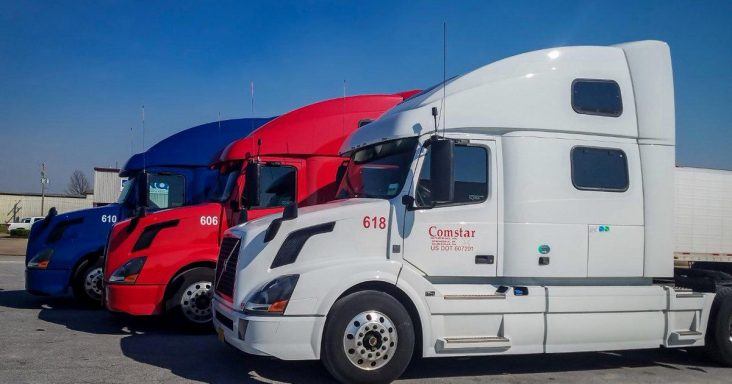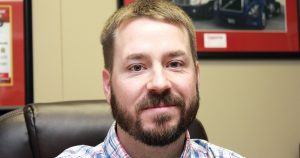Tontitown-carrier Comstar marks 25 years by being ‘brilliant at the basics’
by May 9, 2019 2:38 pm 1,347 views

Since its founding 25 years ago, Tontitown-based Comstar Enterprises Inc. has carved out its own niche in the trucking business.
As a service-based refrigerated carrier, Comstar hauls freight mainly to the Northeast, Southeast and Midwest parts of the country for some of the biggest names in the food industry — Tyson Foods, Windsor Foods, Pinnacle Foods Group, Schwan’s, Shaver Foods, Kerry Foods and Simmons Foods among them.
As the company moves through its silver anniversary year, Comstar President and COO Stephen Ferguson said the business has 115 trailers, about 75 trucks and drivers, and roughly 110 employees.
The carrier — which has about a dozen family members with an ownership stake — reported revenue last year of $23.5 million, a four-year increase of nearly 60%.
Operating in the shadow of much larger transportation companies makes the success more notable. J.B. Hunt Transport Services Inc. and P.A.M. Transportation Services are, of course, in Comstar’s immediate backyard. Prime Inc., the largest refrigerated carrier in the U.S., is just a couple of hours north in Springfield, Mo. John Christner Trucking is two hours west in Sapulpa, Okla., and is also considered a leader in the temperature-controlled carrier space.
Ferguson, whose grandfather Bill Ferguson started the company in 1994, said the road map for success isn’t that complicated: Know what you do well, and do it every day.
“When I was younger, we were at a carrier conference,” he recalled. “The CFO of one of our customers came out and was using a lot of big words. Really nice guy. But he said something pretty simple that’s always stuck with me, to the effect of, ‘Be brilliant at the basics, and the rest will fall into place.’
“If we can do the little things right, we’ll stay as far ahead of the game as possible.”
An example of the little things, Ferguson said, is keeping the company’s equipment new and under warranty.
“I think the oldest [trucks] we have right now are a couple from 2017,” he said. “We’re able to reinvest in our people and our technology and our equipment. That’s really what’s kept us going.”
AN EARLY INTRODUCTION
If you mention long-distance hauls to the northeast part of the U.S., most trucking companies wince.
The region, though, is a primary run for Comstar.
“That’s a place most [trucking companies] don’t want to go,” Ferguson said. “It’s a tough area up there with the infrastructure, the weather and the traffic. It’s a mixed batch of everything, and to get back out of there and on the road is also difficult. And time is money.”
Ferguson, 38, was introduced to the trucking industry as a teenager working for his grandfather’s business.
Bill Ferguson has worked in the trucking industry for more than 50 years as a driver, broker and owner/operator of trucking companies. He came to Northwest Arkansas from Georgia in the 1960s when word began to circulate that a growing poultry business in Springdale was in need of drivers and refrigerated trucks.

“My grandfather was in the transportation business in Georgia, and his boss told him, ‘I’m going to send you to Arkansas,’” Stephen Ferguson recalled. “‘There’s a guy up there that’s got a chicken deal going on.’”
The guy was Don Tyson, and the poultry business was Tyson Foods.
“He [Tyson] and my grandfather were buddies,” Ferguson said. “That’s what gave us our start in Arkansas.”
Bill Ferguson eventually transitioned from driving to freight brokerage, and he opened his own refrigerated trucking business in Tontitown, Polar Express Inc., in the early 1970s. He owned the business for 25 years and at one time had 185 trucks. Tyson Foods was its biggest customer.
After selling Polar Express in 1994, Ferguson founded Comstar. His grandson was 14 and hired on to move pallets, wash trailers — any sort of manual labor that would help the business.
“It was a lot of leg work getting those pallets off-loaded from trailers,” Ferguson said. “And rinsing the trailers. We don’t do that anymore, of course. EPA [Environmental Protection Agency] don’t like that too much.”
Ferguson eventually moved into the Comstar front office to help solicit freight for the company. In 2012, his grandfather semiretired, and Ferguson became president and chief operating officer. One of his first business strategies was to downsize the carrier’s number of trucks.
“We had almost 115 at the time, but a number of them were sitting, and no one had a plan on what to do with them,” he recalled. “Putting [drivers] in trucks just to fill seats was not who we wanted to be.”
Ferguson said what the company does want to be is a trusted business partner for its customers. He said the reputation the company has built for its on-time pickup and delivery is allowing Comstar to offer its services to new customers.
“I don’t want to win awards, but I want our customers to say, ‘When I need something taken care of, Comstar is who we’re going to call,’” he said.
CAPACITY CONCERNS
Like most trucking executives, Ferguson said limited freight capacity is the biggest pain point he shares with customers.
“That’s the biggest thing we hear,” he said. “If we had 100 more drivers we could haul 100 more loads. The loads are there. Even between two or three of our largest customers, they could throw more loads at us than we’d know what to do with.”
So why not invest in more drivers? Competition for qualified candidates is one reason. In fact, Ferguson said he has a running joke with transportation executives working for Tyson Foods’ private fleet about the competitive hiring process.
“They’re our biggest customer, but they’re also one of our largest competitors in terms of drivers,” Ferguson said. “They want us to invest in more trucks to haul freight and I say, ‘Give us some of your drivers.’
“We [trucking companies] are all fighting for the same driver. The good ones are hard to come by, and they’re just not there. It’s a tough industry, and no one wants to do it anymore. The pay is just now catching up to what it should have been 10 years ago.”
Ferguson said Comstar could hire 10 to 15 drivers “yesterday” but, he added, the company is a bit more selective than the industry standard.
“We don’t want to be the biggest by any means,” he said. “We want niche [drivers] that fit into our culture. We’ve got a lot of longtime employees and drivers, and they all care about the business as much as I do. You can’t put a value on something like that.”
